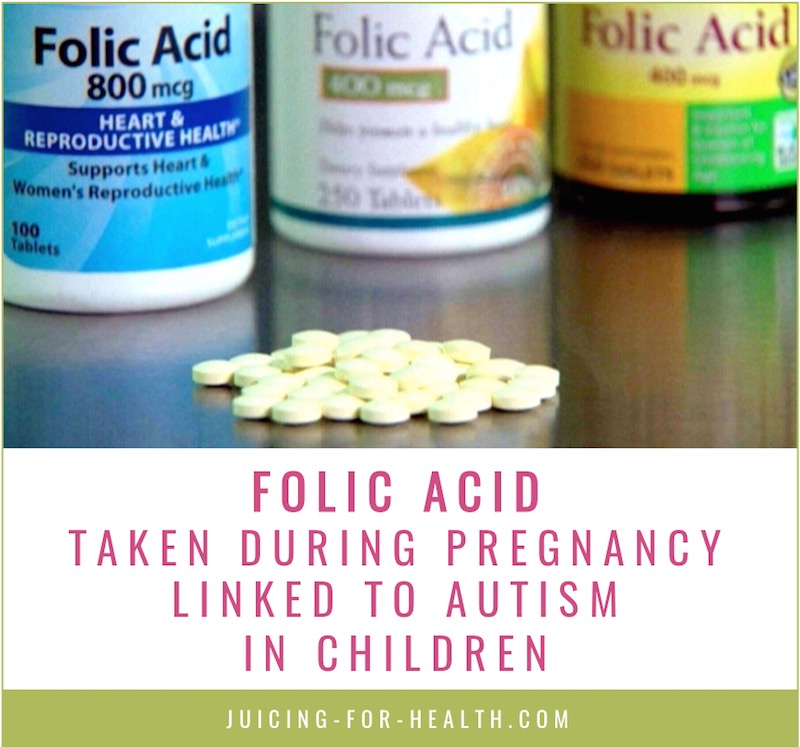Folic Acid Taken During Pregnancy Linked To Autism in Children
Last updated on
Chances are you’ve heard that folic acid is good for you … or was it folate? Aren’t they the same thing, vitamin B9? Nope, and there is a lot of confusion roaming around this topic even among healthcare professionals.
Here’s why this inaccuracy can have terrible consequences: Recent studies show that folic acid has been linked to autism.
What Is Vitamin B9?
Vitamin B9 (a.k.a. folate) is a water-soluble vitamin used in just about every process in the body to break down and build, using proteins with the help of vitamins B12 and C.
Functions of Vitamin B9
Folate is needed in the synthesis of red and white blood cells. It helps produce DNA, the building block of the human body which carries genetic information.
Folate is also needed to enhance brain health and prevent hearing loss.
Deficiency Of Vitamin B9
A deficiency of vitamin B9 during pregnancy leads to neural tube defects. A deficiency of it in children and adults leads to:
- growth and neurological problems
- anemia
- low immunity
- muscle weakness
- extreme fatigue
- short of breath
- ringing in the ears
- thyroid problems
- disturbed vision and psychological problems including anxiety, depression and confusion.
Causes of Vitamin B9 Deficiency
Some of the reasons why people are deficient in folate:
- Diseases in which folic acid is not well-absorbed in the digestive system (such as Celiac or Crohn diseases).
- Pernicious anemia, where your immune system attacks healthy cells in your stomach, preventing proper absorption of nutrients from the food you eat.
- Excessive consumption of alcohol.
- Not eating sufficient fresh fruits and vegetables (folate can be easily destroyed by heat).
- Taking certain medications, including anticonvulsants and proton pump inhibitors (PPIs) can reduce absorption of nutrients in the body.
- Kidney dialysis.

Folate vs Folic Acid: The Good And The Bad Forms of Vitamin B9
Both folate and folic acid are forms of vitamin B9, but this doesn’t mean they are equally good for you.
Folate is the form of vitamin B9 that’s found naturally in different foods. It was named after the Latin word for leaf, “folium”, and this is a perfect reflection of the natural sources of this substance: leafy vegetables, fruits, and herbs. Folate is also found in legumes, seeds, and some animal products (the liver is the best source).
The active form of vitamin B9 is known as levomefolic acid (or 5-methyltetrahydrofolic acid), and the human digestive system is very efficient in transforming natural folate into active B9.
Folic acid, on the other hand, is a synthetic form of B9. The problem is that the human gut isn’t very good in metabolizing folic acid into active B9, so a lot of residual folic acid enters the blood unchanged.
People are taught that there’s no harm in taking water-soluble vitamins, and that excess will just be excreted in the urine if not needed. Well, this is not the case with synthetic folic acid.
Dangers of Excess Folic Acid In The Blood
Part of the folic acid that you consume will be metabolized by the liver and other tissues, but this process is slow and inefficient.
The result is obvious: at any given moment, you have a lot of pure, synthetic folic acid circulating in your blood stream, if your daily intake of folic acid is over 200 mcg (especially if you also eat fortified products and other synthetic supplements).
Excess folic acid circulating in your blood stream hogs the receptor sites on cells where folate is needed, causing a deficiency, and causing all the symptoms discussed above.
And this is why it gets bad when you’re pregnant!
Folic Acid Taken During Pregnancy Linked To Autism In Children
Some years ago, scientists noticed that the incidence of autism increased at the same time with the worldwide policy of increasing folic acid supplementation. A coincidence on a planetary scale? That would be very unlikely, so doctors and scientists started digging into the matter.
However, studies showed mixed results: some researches reported that folic acid increases the risk of developing autism (by up to 2.5 times) while others claimed it protected from autism.
Here’s a list of what has been discovered so far:
- Nearly all folate (from natural sources) is quickly metabolized into active vitamin B9, while synthetic folic acid is used up much slower.
- When the daily intake of folic acid (NOT folate) is more than 200 mcg, unmetabolized folic acid is found in the blood. This includes the blood that goes through the umbilical cord during pregnancy.
- A lot of women take more folic acid than recommended during pregnancy (supplements plus fortified products).
- Animal studies indicate that high levels of folic acid during gestation increased anxiety and hyperactivity in offspring, as well as caused other changes in behavior.
- Synthetic folic acid is able to significantly impair the normal development and activity of nerve cells and the formation of connections between them.

Early Fetus Brain Development
Folic acid appears to be critical to the earliest phase of fetus development, and we learned that early supplementation seems to be protective against autism. After embryonic day 28, however, folic acid is no longer needed as the fetus has moved on to new stages of development.
After embryonic day 42, when neurons start forming, taking folic acid may unnecessarily expose developing fetuses to excessive amounts of this methyl compound, that in some cases may disrupt the delicate genetic machinery that produces the molecular products necessary for normal brain growth.
In short, it seems that having healthy levels of vitamin B9 is extremely important during the very early stage of pregnancy (whether it is natural folate or folic acid supplements), to avoid such dreadful conditions such as spina bifida and anencephaly.
On the other hand, having the same amount of folic acid during the second and third trimester that are unused in the body, may increase the risk of the child developing autism.
Natural folate is safe at all times, and it’s used up much more efficiently by the human body. In other words, why risk when you can go for the natural and safe option?
Natural Sources Of Folate
According to the NIH (National Institutes of Health), the recommended dietary allowance for naturally occurring folate in adults is 400 mcg daily (or 600 mcg during pregnancy, or 500 mcg during lactation) and never more than 1000 mcg daily.
Below you’ll find a comprehensive list of the best natural sources of folate. We also did the math to tell you how much of these foods you should eat to meet your daily 400 mcg dose.
(All numbers sourced from the USDA Food Composition Database)
| Food | Folate content (mcg / 100 g) |
How much to eat to meet daily dose (in grams) |
| Duck liver, raw | 738 | 54 |
| Chicken liver, raw | 588 | 68 |
| Dried basil | 310 | 129 |
| Dried rosemary | 307 | 130 |
| Wheat germ, crude | 281 | 142 |
| Peanuts, raw | 240 | 167 |
| Roasted sunflower seed kernels | 238 | 168 |
| Raw spinach | 194 | 206 |
| Quinoa, raw | 184 | 217 |
| Lentils, boiled | 181 | 221 |
| Chickpeas, boiled | 172 | 233 |
| Asparagus, boiled | 149 | 268 |
| Spinach, boiled | 146 | 274 |
| Kidney beans, boiled | 130 | 308 |
| Beets, raw | 109 | 367 |
| Broccoli, boiled | 108 | 370 |
| Chives, raw | 105 | 381 |
| Arugula, raw | 97 | 412 |
| Artichokes, boiled | 89 | 449 |
| Avocados, raw | 81 | 494 |
| Cress, raw | 80 | 500 |
| Basil, fresh | 68 | 588 |
| Egg, whole, hard-boiled | 44 | 909 |
As you can see, the easiest way to meet your daily folate goal is by eating enough legumes, spices (like basil and rosemary), and animal liver if you’re not a vegetarian or vegan. Wheat germs are another great lifehack to help you in that.
The only danger is that you can easily go over 400 mcg if you eat products fortified with folic acid, take supplements, and eat the products listed above, everything at the same time.
Conclusion
It’s important to understand that folic acid itself is NOT a bad thing. Quite the contrary: for people who don’t want to eat healthy (or can’t, for any reason), folic acid is a good way to prevent serious nervous system defects.
The problem is that, it’s easy to go over the top with folic acid, and thus possibly increase the risk of autism. The choice is yours, just remember these important numbers:
- If possible, opt for natural folate instead of folic acid. Aim for 400 mcg of folate daily, all from legumes, leafy vegetables, and animal liver (if your worldview allows it).
- If, for any reason, you absolutely have to take folic acid, do your best to take no more than 200 mcg of the substance daily (this includes supplements, vitamins, fortified products) to prevent unmetabolized folic acid circulating through your body.
Follow these simple tips and enjoy your pregnancy!
Some of the links I post on this site are affiliate links. If you go through them to make a purchase, I will earn a small commission (at no additional cost to you). However, note that I’m recommending these products because of their quality and that I have good experience using them, not because of the commission to be made.
Comments
Leave a Reply

































 JOIN OVER
JOIN OVER
This article is inaccurate and not based on any substantial, reliable studies. There is definitely not confusion among health Care professionals about this (as I am a health care profesional) and academic papers have not shown any link between folic acid supplementation and autism. Folic acid is necessary to prevent Spina bifida in newborns.
Please be careful propagating false information as this can have consequences for those who listen to you.
Dear Ashley, did you even read the article in its entirety? It does not say that folic acid is unnecessary. Furthermore, I provided links to many studies done by government bodies, in the article. Perhaps, there really is some truth in healthcare professionals being confused about this topic?